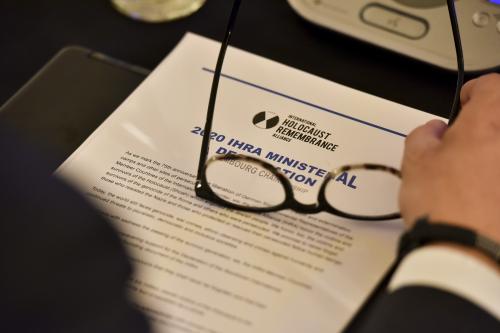The 2020 IHRA Ministerial Declaration: A World That Remembers The Holocaust – A World Without Genocide

“As we mark the 75th anniversary of the liberation of German Nazi concentration and extermination camps and other sites of persecution and murder, we, the High Governmental Representatives of the Member Countries of the International Holocaust Remembrance Alliance (IHRA) honor the victims and survivors of the Holocaust (Shoah) which engulfed the Jewish people. We honor, too, the victims and survivors of the genocide of the Roma and others who were persecuted. We promise to never forget those who resisted the Nazis and those who protected or rescued their persecuted fellow human beings. Today, the world still faces genocide, war crimes, ethnic cleansing and crimes against humanity and continued threats to pluralistic, democratic and inclusive societies.”
On 19 January 2020, ministers and representatives of 35 countries and international organisations assembled in Brussels and adopted the 2020 IHRA Ministerial Declaration, a document that for years to come will guide their work in Holocaust remembrance, education and research, and against antisemitism, antigypsyism and other forms of discrimination.
Since 2000, the work of the International Holocaust Remembrance Alliance (IHRA) has been guided by the commitments first set out in the Stockholm Declaration, considered the founding document of the IHRA.
In the two decades after the breakthroughs achieved by the Stockholm Declaration, it is now time for a much more serious commitment. Part of the reason for this is the passing of time and the very real consequence this has within the field of Holocaust remembrance.
In 2000, when the Stockholm Declaration was adopted, approximately 800,000 Holocaust survivors were still living, able to give testimony and share their story. The words of the Stockholm Declaration reflected this, stating that the Holocaust “remains an event close enough in time that survivors can still bear witness to the horrors that engulfed the Jewish people.” Today, according to estimates from IHRA Permanent International Partner the Claims Conference, only about half the number of survivors remain, a fact explicitly recognized in the opening lines of the IHRA Ministerial Declaration:
“As we witness with sadness the passing of the survivor generation, we, the IHRA Member Countries (…)”
After this line follow 14 solemn commitments, among which:
“Pledge to the victims and survivors that they shall never be forgotten and that their legacy will be kept alive.
Emphasize that remembering the six million Jewish victims of the Holocaust is the responsibility not only of governments but of societies as a whole.”
Apart from the demise of Holocaust survivors who can give testimony, Honorary Chairman of the IHRA, Professor Yehuda Bauer, who himself was forced to flee Czechoslovakia in 1939, points to two other developments that over the past 20 years have loomed as an ever-greater threat to Holocaust remembrance, education, and research:
“[The Stockholm Declaration] was tied to the situation as it was then, and in the meantime mainly two developments have made another major diplomatic effort necessary: First, the development of Holocaust distortion, against the background of a revival of antisemitism, and second, difficulties encountered in the sphere of education, both in schools and for adults at universities.”
While a number of solutions to the challenges faced by educators and teachers were presented in the IHRA’s 2019 Recommendations for Teaching and Learning about the Holocaust, the growing threat of Holocaust distortion remains among the most urgent issues still to be addressed. As a consequence, a Task Force Against Holocaust Denial and Distortion has been formed to combat this worrying trend. With antisemitism on the rise internationally, we see Holocaust denial and distortion becoming more and more prevalent in contemporary culture, from media to politics across the ideological spectrum.
EHRI and the IHRA
EHRI and the IHRA uphold close connections and the work of the two organisations is mutually reinforcing. Whereas IHRA has a political component, EHRI focusses on facilitating and advancing transnational Holocaust research. The support of 34 countries for the Ministerial Declaration is a great boost for EHRI and its endeavor to become a permanent organization. While EHRI fully supports all the 14 statements in the Ministerial Declaration, it feels especially dedicated to article 10, which promises to:
“Underline the importance of identifying, preserving, and making available archival material, testimonies and authentic sites for educational purposes, commemoration and research.”
Enabling transnational Holocaust research by providing access to Holocaust archives is EHRI’s core mission. Access to authentic Holocaust documents is not only a powerful weapon against distortion or denial of the Holocaust, but also vital in the context of the passing away of the survivor generation: there will soon come the point when we will be without anyone who can speak directly from experience about the Holocaust, but the resources and tools that EHRI provides play a vital role in the future of Holocaust research, commemoration and education. We can never replace the survivors, but we can honour and remember them by continuing to improve access to Holocaust sources. EHRI is dedicated to this task.
The first of two semiannual Plenary meetings hosted by the German Presidency of the IHRA are held this week, from 29 June - 2 July. The virtual meetings bring together over 250 delegates from a network of policymakers and Holocaust experts from more than 40 countries to discuss efforts in the field of Holocaust education, remembrance, and research. Read more
Image thanks to IHRA
